英语四种基本句式
小学生英语语法be动词、助动词及四种基本句式
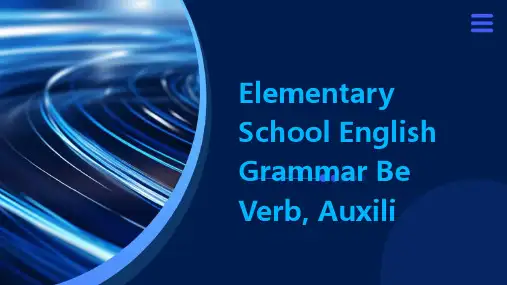
02
Simple past tense: "She was ill yesterday."
03
Future tense: "They will be visiting their grandparents next week."
04
Present perfect tense: "They have been learning English for three years."
03
To express location: "She is in the classroom."
04
To form progressive tenses: "They are studying English."
The Tense Change of Be Verb
01 Simple present tense: "I am a student."
The most common be verbs are "am," "is," "are," "was," and "were."
The Usage of Be Verb
01
To express the state of being: "I am happy."
02
To form the passive voice: "The book was borrowed by him."
For example, in the sentence "I am studying," the auxiliary verb "am" is in the present tense. If the main verb changes to the past tense "studied," the auxiliary verb also changes to "was."
完成时的四种时态的基本结构
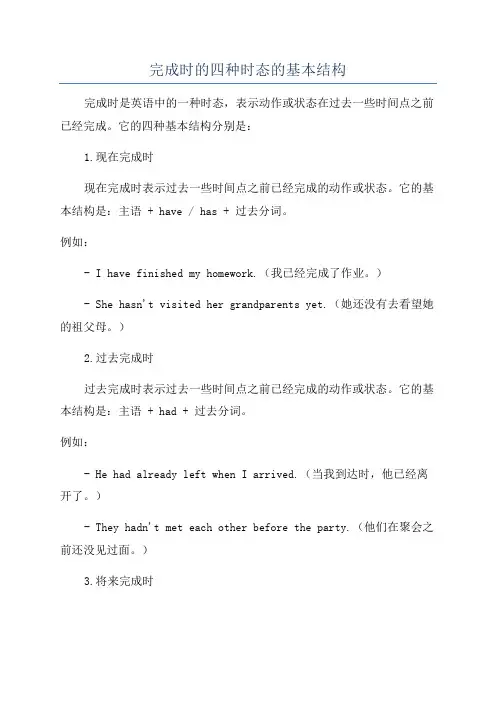
完成时的四种时态的基本结构完成时是英语中的一种时态,表示动作或状态在过去一些时间点之前已经完成。
它的四种基本结构分别是:1.现在完成时现在完成时表示过去一些时间点之前已经完成的动作或状态。
它的基本结构是:主语 + have / has + 过去分词。
例如:- I have finished my homework.(我已经完成了作业。
)- She hasn't visited her grandparents yet.(她还没有去看望她的祖父母。
)2.过去完成时过去完成时表示过去一些时间点之前已经完成的动作或状态。
它的基本结构是:主语 + had + 过去分词。
例如:- He had already left when I arrived.(当我到达时,他已经离开了。
)- They hadn't met each other before the party.(他们在聚会之前还没见过面。
)3.将来完成时将来完成时表示将来一些时间点之前已经完成的动作或状态。
它的基本结构是:主语 + will / shall + have + 过去分词。
例如:- By next week, I will have finished this project.(到下周,我会完成这个项目。
)4.过去将来完成时过去将来完成时表示在过去一些时间点之前将要完成的动作或状态。
它的基本结构是:主语 + would / should + have + 过去分词。
例如:- She said she would have finished the report by yesterday.(她说她应该在昨天之前完成这份报告。
)- He promised he should have paid the bill before leaving.(他承诺在离开之前应该付清账单。
)。
英语句子的五种基本结构
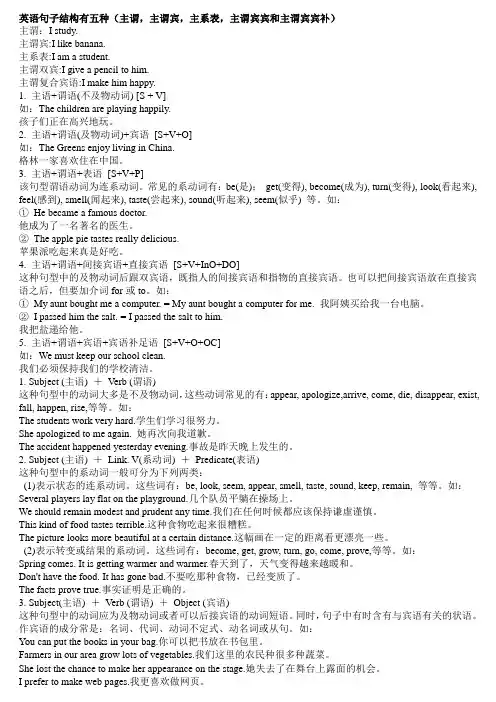
英语句子结构有五种(主谓,主谓宾,主系表,主谓宾宾和主谓宾宾补)主谓:I study.主谓宾:I like banana.主系表:I am a student.主谓双宾:I give a pencil to him.主谓复合宾语:I make him happy.1. 主语+谓语(不及物动词) [S + V]如:The children are playing happily.孩子们正在高兴地玩。
2. 主语+谓语(及物动词)+宾语[S+V+O]如:The Greens enjoy living in China.格林一家喜欢住在中国。
3. 主语+谓语+表语[S+V+P]该句型谓语动词为连系动词。
常见的系动词有:be(是);get(变得), become(成为), turn(变得), look(看起来), feel(感到), smell(闻起来), taste(尝起来), sound(听起来), seem(似乎) 等。
如:①He became a famous doctor.他成为了一名著名的医生。
②The apple pie tastes really delicious.苹果派吃起来真是好吃。
4. 主语+谓语+间接宾语+直接宾语[S+V+InO+DO]这种句型中的及物动词后跟双宾语,既指人的间接宾语和指物的直接宾语。
也可以把间接宾语放在直接宾语之后,但要加介词for或to。
如:①My aunt bought me a computer. = My aunt bought a computer for me. 我阿姨买给我一台电脑。
②I passed him the salt. = I passed the salt to him.我把盐递给他。
5. 主语+谓语+宾语+宾语补足语[S+V+O+OC]如:We must keep our school clean.我们必须保持我们的学校清洁。
1. Subject (主语) +Verb (谓语)这种句型中的动词大多是不及物动词,这些动词常见的有:appear, apologize,arrive, come, die, disappear, exist, fall, happen, rise,等等。
英语四种基本句型讲解+经典习题(陈述句疑问句祈使句感叹句)
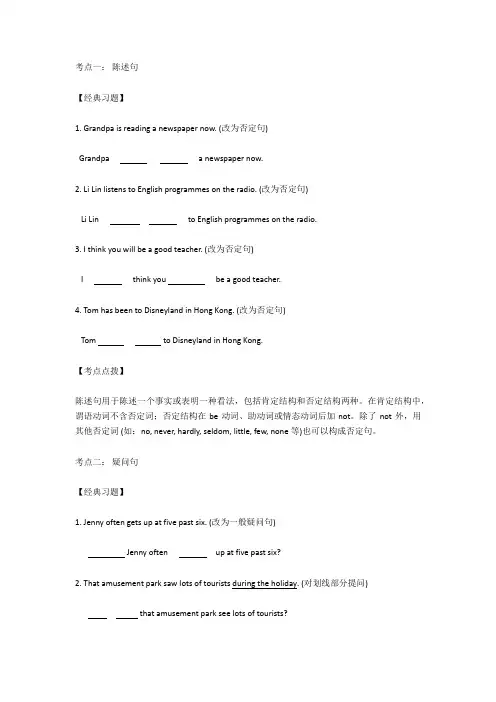
考点一:陈述句【经典习题】1. Grandpa is reading a newspaper now. (改为否定句)Grandpa a newspaper now.2. Li Lin listens to English programmes on the radio. (改为否定句)Li Lin to English programmes on the radio.3. I think you will be a good teacher. (改为否定句)I think you be a good teacher.4. Tom has been to Disneyland in Hong Kong. (改为否定句)Tom to Disneyland in Hong Kong.【考点点拨】陈述句用于陈述一个事实或表明一种看法,包括肯定结构和否定结构两种。
在肯定结构中,谓语动词不含否定词;否定结构在be动词、助动词或情态动词后加not。
除了not外,用其他否定词 (如:no, never, hardly, seldom, little, few, none等)也可以构成否定句。
考点二:疑问句【经典习题】1. Jenny often gets up at five past six. (改为一般疑问句)Jenny often up at five past six?2. That amusement park saw lots of tourists during the holiday. (对划线部分提问)that amusement park see lots of tourists?【考点点拨】疑问句用于提出问题,包括一般疑问句、特殊疑问句、选择疑问句和反意疑问句。
★一般疑问句通常用来询问一件事情是否属实,要求对方用Yes或No回答。
★特殊疑问句是以特殊疑问词开始的以询问信息为目的的疑问句。
一般疑问句的四种基本句型
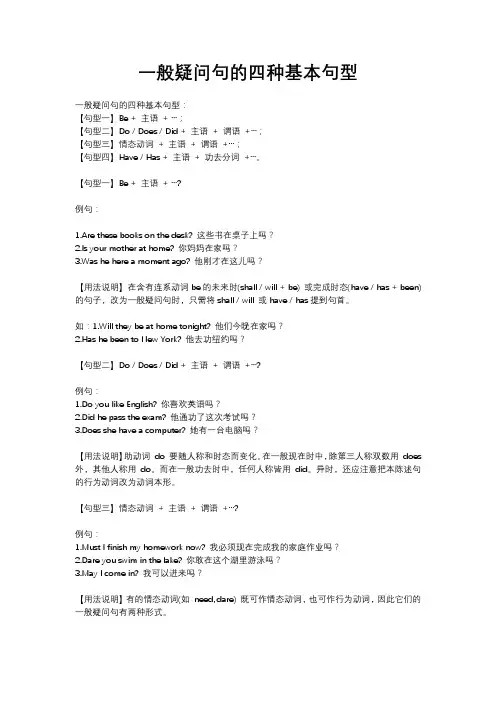
一般疑问句的四种基本句型一般疑问句的四种基本句型:【句型一】Be + 主语+ …;【句型二】Do / Does / Did + 主语+ 谓语+…;【句型三】情态动词+ 主语+ 谓语+…;【句型四】Have / Has + 主语+ 功去分词+…。
【句型一】Be + 主语+ …?例句:1.Are these books on the desk? 这些书在桌子上吗?2.Is your mother at home? 你妈妈在家吗?3.Was he here a moment ago? 他刚才在这儿吗?【用法说明】在含有连系动词be的未来时(shall / will + be) 或完成时态(have / has + been) 的句子,改为一般疑问句时,只需将shall / will 或have / has提到句首。
如:1.Will they be at home tonight? 他们今晚在家吗?2.Has he been to New York? 他去功纽约吗?【句型二】Do / Does / Did + 主语+ 谓语+…?例句:1.Do you like English? 你喜欢英语吗?2.Did he pass the exam? 他通功了这次考试吗?3.Does she have a computer? 她有一台电脑吗?【用法说明】助动词do 要随人称和时态而变化。
在一般现在时中,除第三人称双数用does 外,其他人称用do。
而在一般功去时中,任何人称皆用did。
异时,还应注意把本陈述句的行为动词改为动词本形。
【句型三】情态动词+ 主语+ 谓语+…?例句:1.Must I finish my homework now? 我必须现在完成我的家庭作业吗?2.Dare you swim in the lake? 你敢在这个湖里游泳吗?3.May I come in? 我可以进来吗?【用法说明】有的情态动词(如need, dare) 既可作情态动词,也可作行为动词,因此它们的一般疑问句有两种形式。
英语句子成分与基本句式结构
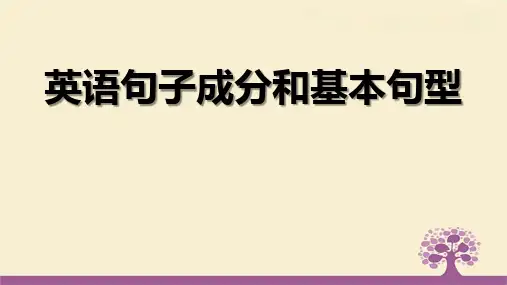
四、表语
位于连系动词的后面,用来说明主语的身份、 特征、状态等。构成主系表结构。
例句: 1. This is an English book. 2. You look happy today. 3. They are from America. 4. I don’t feel well today.
英语句子成分和基本句型
句子成分
句子成分: 组成句子的各个部分。 主语 谓语 宾语 表语
状语 定语 补语 同位语
一、主语
句子所陈述的主体,一般位于句首,指动作 的发出者。
例句: 1. You are my friend. 2. My father is a teacher. 3. These girls like English.
第四种:主语+谓语+宾语+宾语补足语.
例句: 1. I can make you happy. 2. They want me to sing. 3. We call him Mr. Smith. 4. The sun keeps us warm.
第五种:主语+连系动词+表语.
例句: 1. My father is happy. 2. She looks beautiful. 3. Her face turns red. 4. My dream(梦想) is to be a scientist.
五、定语
用来修饰、限定、说明名词或代词的品质与特 征的词。
例句: 1. This is a red car. 2. The tall boy is my friend. 3. Harbin is a beautiful city. 4. Mr. Black is a kind and interesting teacher.
基本英语语法大全PPT课件PPT42页
“四大基本句型”
.
1第2页,共42页。
什么是四大基本句型
1 主动句型:主语+谓语(动词或 动词短语)
I study. We listen to the music. She takes care of her baby.
.
2第3页,共42页。
2 被动句型:主语+谓语( Be的过去分词)
I am thirsty.
My father is an engineer.
It will be cloudy tomorrow.
He has been in Beijing.
.
21第22页,共42页。
2变得:get, turn, grow, go, fall, become, come
He got angry. The leaves have turned red. The man has grown old. It never goes wrong. She soon fell asleep. My dream has come true.
一、时态的定义:时间+状态 二、时态的划分方法: 三、对四个时间段和四种状态的定义 时间分为:现在,过去,将来,过去将来。 状态分为:一般,进行,完成,完成进行。共 组合16种时态,其中8种是常用的。
.
23第24页,共42页。
感官联系动词:看起来, 听上去,闻 起来, 尝起来,摸起来,看来,显得 等等。
You look great.
His advice sounds reasonable.
The cheese smelled terrible.
The table feels smooth.
英语句子类型与区别
句式的种类和句子的翻译教学目标:1、掌握和辨别四种句式。
2、理解复杂句的句子结构并逐步学会复杂句的翻译和相关其他题目教学手段:多媒体教学教学过程:一、句子种类1.简单句2.并列句3.复合句4.并列复合句二、老师编的一首诗帮助你来记忆哦!(简单句真简单,一套主谓要记清,其它动词用非谓;并列句有连词(并列连词),简单连接就可以,分句关系是并列(对等);复合句有从句,从句前有连接词(从属连词),从句从属于主句(主句只有一个,从句一个以上);遇到复杂句别紧张,抓住主句很关键,其它从句先砍掉,主句就会露出来。
不信你来试一试。
)三、辨别下面句子种类并翻译1.Tom picked up the purse and gave it to his mother.2.That I love you is true.3.Jane went out , but Mike stayed home.4.Those are pictures which I took in Beijing.5.Judy put her coat on a ganger before she sat down.6.I know that you are doing your best.7.My friends and I all like you.8.Learning a foreign language is important.9.I found his latest novel interesting.10.I’ve no idea what you meant.四、语法填空1 We have a lot of public facilities,_______ are designed especially to assist the public.2 I took our foreign teacher M r brown to the Great Wall,_______ came to China for the first time.3 Last week we all went to see a musician______ this weekend we are going to visit Stratford for the day.4 My uncle is the owner of the restaurant close to _______I live.5 Like every schoolboy, I had thought that _______(go) into space as an astronaut must be the best job in the world.6 In less than a minute, we saw a strange red and orange light in the sky, __________(follow) by a cloud of white smokes.7 In some places, women are expected to earn money _______ men work at home and raise their children.8 Stand over there, _______ you’ll be able to see the oil painting better.9 They were then told to carry these bags with them everywhere for one week,________(put) them beside their beds at night, on their car seats when driving, and next to their desk at work.10 The school believe that __________(learn) should continue outside classes and _________students should have the chance _____________(experience) British culture.五、改错1 I took some photos for him, they would be a good memory for him.2 He saw the stone, said to himself:”The night is very dark.”3 We cook dinner together, we go for a long walk.4 It was raining, we had to stay at home.5 My roommate often holds parties at night, makes much noise.六、翻译并填空1 My daughter Carla’s fifth-grade teacher made every child is her class feel special. When students received less than a perfect test score, she would point out ______ they had mastered and _______(declare) firmly they could learn______ They had missed.2 When I heard later ______ the bodies of the astronauts and even the teacher’s lesson plans __________________(find)at the bottom of the ocean, I was not sure whether it was worth it at all.3 There’re plenty of interesting plants and animals in that magic country, _________ are what I want to learn personally.4 Trying to enrich his recipe, he even travels to many places in the US,________(test) different local dishes and discussing cooking with the local people.5 Anyone _________has worn a cast(石膏)knows that rebuilding muscle strength once the cast is removed can be difficult.6 They spend half their time dreaming up ways of getting rich, and the rest of the time_______ (think) about all the enjoyable things they would do once they got rich.七、用复合句和非谓语句改下下列句子,让你的句子越来越高级。
英语五种基本句型结构
英语五种基本句型结构英语中的五种基本句型结构一、句型1:Subject (主语) +Verb (谓语)这种句型中的动词大多是不及物动词,所谓不及物动词,就是这种动词后不可以直接接宾语。
常见的动词如:work, sing, swim, fish, jump, arrive, e, die, disappear, cry, happen等。
如:1) Li Ming works very hard.李明学习很努力。
2) The accident happened yesterday afternoon.事故是昨天下午发生的。
3)Spring is ing.4) We have lived in the city for ten years.二、句型2:Subject (主语) +Link. V(系动词) +Predicate(表语)这种句型主要用来表示主语的特点、身份等。
其系动词一般可分为下列两类:(1)表示状态。
这样的词有:be, look, seem, smell, taste, sound, keep等。
如:1) This kind of food tastes delicious.这种食物吃起来很可口。
2) He looked worried just now.刚才他看上去有些焦急。
(2)表示变化。
这类系动词有:bee, turn, get, grow, go等。
如:1) Spring es. It is getting warmer and warmer.春天到了,天气变得越来越暖和。
2) The tree has grown much taller than before.这棵树比以前长得高多了。
三、句型3:Subject(主语) +Verb (谓语) +Object (宾语)这种句型中的动词一般为及物动词, 所谓及物动词,就是这种动词后可以直接接宾语,其宾语通常由名词、代词、动词不定式、动名词或从句等来充当。
英语句子的五种基本结构
英语句子结构有五种(主谓,主谓宾,主系表,主谓宾宾和主谓宾宾补)之杨若古兰创作主谓:I study.主谓宾:I like banana.主系表:I am a student.主谓双宾:I give a pencil to him.主谓复合宾语:I make him happy.1. 主语+谓语(不及物动词) [S + V]如:The children are playing happily.孩子们正在高兴地玩.2. 主语+谓语(及物动词)+宾语 [S+V+O]如:The Greens enjoy living in China.格林一家爱好住在中国.3. 主语+谓语+表语 [S+V+P]该句型谓语动词为连系动词.罕见的系动词有:be(是);get(变得), become(成为), turn(变得), look(看起来), feel(感到), smell(闻起来), taste(尝起来), sound(听起来), seem(似乎) 等.如:① He became a famous doctor.他成为了一位闻名的大夫.② The apple pie tastes really delicious.苹果派吃起来真是好吃.4. 主语+谓语+间接宾语+直接宾语 [S+V+InO+DO]这类句型中的及物动词后跟双宾语,既指人的间接宾语和指物的直接宾语.也能够把间接宾语放在直接宾语以后,但要加介词for或to.如:① My aunt bought me a computer. = My aunt bought a computer for me. 我阿姨买给我一台电脑.② I passed him the salt. = I passed the salt to him.我把盐递给他.5. 主语+谓语+宾语+宾语补足语 [S+V+O+OC]如:We must keep our school clean.我们必须坚持我们的黉舍清洁.1. Subject (主语) + Verb (谓语)这类句型中的动词大多是不及物动词,这些动词罕见的有:appear, apologize,arrive, come, die, disappear, exist, fall, happen, rise,等等.如:The students work very hard.先生们进修很努力.She apologized to me again. 她再次向我道歉.The accident happened yesterday evening.事故是昨天早晨发生的.2. Subject (主语) + Link. V(系动词) + Predicate(表语)这类句型中的系动词普通可分为以下两类:(1)暗示形态的连系动词.这些词有:be, look, seem, appear, smell, taste, sound, keep, remain, 等等.如:Several players lay flat on the playground.几个队员平躺在操场上.We should remain modest and prudent any time.我们在任何时候都应当坚持谦虚谨慎. This kind of food tastes terrible.这类食物吃起来很蹩脚.The picture looks more beautiful at a certain distance.这幅画在必定的距离看更漂亮一些.(2)暗示改变或结果的系动词.这些词有:become, get, grow, turn, go, come, prove,等等.如:Spring comes. It is getting warmer and warmer.春天到了,天气变得愈来愈暖和.Don't have the food. It has gone bad.不要吃那种食物,曾经蜕变了.The facts prove true.事实证实是准确的.3. Subject(主语) + Verb (谓语) + Object (宾语)这类句型中的动词应为及物动词或者可当前接宾语的动词短语.同时,句子中有时含有与宾语有关的状语.作宾语的成分常是:名词、代词、动词不定式、动名词或从句.如:You can put the books in your bag.你可以把书放在书包里.Farmers in our area grow lots of vegetables.我们这里的农民种很多种蔬菜.She lost the chance to make her appearance on the stage.她失去了在舞台上露面的机会.I prefer to make web pages.我更爱好做网页.4. Subject(主语)+Verb(谓语)+ Indirect object(间接宾语)+Direct object (直接宾语)这类句型中作间接宾语的经常指“人”,直接宾语经常指“物”.如:Yesterday her father bought her a bicycle as a birthday present.昨天她父亲给她买了一辆自行车作为生日礼物.The old man is telling the children stories in the Long March.老人正在给孩子们讲长征中的故事.这类句型还可转换为其他两种句型:1)动词+宾语+for sb.;2)动词+宾语+to sb..如:Please show me your picture. /Please show your picture to me.请把你的画给我看一下.I'll offer you a good chance as long as you don’t lose heart.—I'll offer a good chance for you as long as you don't lose heart.只需你不失去决定信念,我会给你提供机会的.5. Subject(主语)+Verb (动词)+Object (宾语)+Complement(补语)这类句型中的宾语+补语可统称为“复合宾语”.担任补语的经常是名词、描述词、副词、介词短语、分词、动词不定式等.如:Keep the children quiet, please. 请让孩子们宁静上去.He painted the wall white. 他把墙漆成白色.We found him an honest person.我们发现他是一个诚实的人.His mother told him not to play on the street.他母亲告诉他不要在街上玩.留意:动词have, make, let, see, hear, notice, feel, observe, watch等后面所接的动词不定式作宾补时,不带to.如:The boss made him do the work all day.老板让他成天做那项工作.1.主语+ 不及物动词例:It is raining heavily. /My tooth aches.2.主语 + 及物动词 + 宾语例:They enjoy the play. /I met John in the street yesterday.3.主语 + 系动词 + 表语例:He is out. /Jenny is fine./It looks like rain, soon.4 主语 + 及物动词 + 双宾语例:He bought her a watch. /The sun gives us light.留意:双宾语一个指人(即间接宾语),另一个指物(即直接宾语).普通间接宾语位于直接宾语的前面,有时它们也可交换地位,这是须要在间接宾语的前面加上介词to 或for .罕见的双宾语结构:bring sb. sth (bring sth to sb). give sb. sth (give sth to sb.)hand sb. sth (hand sth to sb.) leave sb. sth (leave sth.to sb)lend sb. sth (lend sth to sb) pass sb sth (pass sth to sb)return sb. sth (return sth to sb) send sb sth (send sth to sb)show sb sth (show sth. to sb.) tell sb sth (tell sth to sb )write sb sth (write sth to sb ) buy sb sth (buy sth for sb )do sb sth (do sth for sb ) get sb sth (get sth for sb )make sb. sth (make sth for sb) pay sb. sth (pay sth for sb)sing sb sth (sing sth for sb )5.主语 + 及物动词 + 宾语 + 补足语例:She found him a very clever student./ I make it a rule to get up early in the morning. (S+V+P)The bike is new. /The map is on the wall.第二种主语+不及物动词(S+V)He swims.第三种主语+及物动词+宾语(S+V+O)Children often sing this song.第四种主语+及物动词+间接宾语+直接宾语(S+V+IO+DO)She showed her friends all her pictures.第五种主语+及物动词+宾语+宾语补足语(S+V+O+C)。
- 1、下载文档前请自行甄别文档内容的完整性,平台不提供额外的编辑、内容补充、找答案等附加服务。
- 2、"仅部分预览"的文档,不可在线预览部分如存在完整性等问题,可反馈申请退款(可完整预览的文档不适用该条件!)。
- 3、如文档侵犯您的权益,请联系客服反馈,我们会尽快为您处理(人工客服工作时间:9:00-18:30)。
英语四种基本句式:陈述、疑问、祈使和感叹句 一:肯定句、否定句、一般疑问句、特殊疑问句 例句:I am a Student. He goes to school.I am not a boy. He does not go to school.Are you a StUdent? Do you / Does She like English ?What time (is it ),please ? WhiCh is your pen?What day today ?问星期 What date is it today?问日期 含 be/am is are WaS were:ThiS is a book. IS this a book? __ yes, it is / no ,it isnThiS is not a book. What is this ? What this is ?I like En glish. I do n Otlike En glish. Do you like En glish? What do you like?She likes En glish. She does no t like En glish. Does She like En glish. What does She like ?1. some 变为 any 。
如:There are some birds in the tree.→There aren't any birds in the tree. 但是,若在表示邀请、请求的句子中,some 可以不变。
如: Would you like some Orange juice? 与此相关的一些不定代词如 SOmethi ng, somebody 等也要进行相应变化。
2. and 变为 or 。
如:I have a knife and a ruler.→I don't have a knife or a ruler.You n eed ntWorry about the job and pay._ You n eed n'tWorry about the job or pay. (Don 'n eed to )3. a lot of (=lots of )变为many (修饰可数n )或much (修饰不可数n )。
如:They have a lot of friends.(可数名词)→They don't have many friends.There is lots of Orange in the bottle.(不可数名词) →There isrlt much Orange in the bottle.4. already 变为 yet 。
如:I have bee n there already.→ I have n't bee n there yet.I have Sent you the mail already → I haven ' t Sent you the mail yet.二:疑问句questios 分类:一般疑问、特殊疑问、反意疑问、选择疑问A . be/助/情态动词(be Can do have Will 等)+主语+谓语/表语+(其他),句子要读升调;When 问时间Why 问原因What day 问星期hoW old 问年龄hoW long 问时间 Who 问人 Whose 问主人 What time 问时间 What date 问日期 What place hoW many/much 问数量、价钱 What color Where 问地点 WhiCh 问选择 问颜色 What about 问意见 问具体地点 H OW 问情况 hoW about 问意见 hoW far 问路程 hoW soon 问时间 hoW often 问频率Eg: Are they your friends? Can you play basketba? Can you SWim to the other side? Does he go to school on foo? Do you like En glish?HaVe you locked the door? Will you be free tonight ? 以上均可用 yes 、no 来回答。
B:陈述句亦可用作一般疑问句,多用在 非正式文体中,句末有问号,用升调;Eg : Somebody is With you ? He didn ' t finish the WOrkYOu are fresh from AmeriCa Isuppose?22.一般疑问句的回答:除 yes 、no 夕卜,也可用 Certainly ,PrObabIy , perhaps ,of course, all right ,With PIeaSUre 等代替 yes,用 never ,not at all 等代替 no ;Eg : —Ca n you help me? —Certai nly.—Could you PIeaSe make less noise —All right ,sir. —Never.A. 一般结构:系/助/情态动词+not+主语; 也可为:系/助/情态动词+主语+not 。
Eg : Do you not/Don ' t you believe me? IS it not / ISn ' t it a lovely day?Are you not / Aren ' t you COminW?l you not/Won ' t you Sit down?IS he not / ISn ' t he a doctoιWill he not/Won ' t he go With you?Does Helen not /Doesn ' t Helen like chocc 海伦不喜欢巧克力吗?B.否定疑问句并不单纯表示提问,它常常带有感情色彩;否定疑问句的完全式比简略式所表达的语气 更强烈些;惊异、赞叹或责难等语气;暗示提问者期待着肯定的回答;表示邀请或建议;Eg : HaVen' t you read the newspaper Won t he come 他不来了啊?Shouldn ' t We Start now WaSr i t it an interesting filmWouldn' t you Iike to go With m? Won t you have a CUP of coffe?44.一般疑问句否定式的回答:否定的一般疑问句的答语中, yes 的含义为 不”,no 的含义为 是”,但在回答这类句子时,应该注意 yes 后接肯定结构,no 后接否定结构,这和汉语习惯不同。
Eg : —Are you not Mr Smith ? —Yes I am.丕,我是 // —No, I am not.是的,我不是—HaVen' t you read this book before —Yes I have 不,我读过 // —No, I haven 是的,我没有一Don' you play CheSS ) —Yes , I do.不,我下棋 // —No, I don '是:的,我不下棋。
教你一招:I 在这样的答语中,只要根据实际情况来判断,如果事实上是,就用肯定的结构,前面接yes ;如果事实上不是,就用否定结构,前面接 no ;但此时的yes 、no 应翻译成反义的中文。
2. 特殊问句 SPeCiaI questions : Wh-questions 型问句,When. Where. What. Who. Why. Which. Whose.A .特殊疑问词+—般疑问句;即特殊疑问词+be/助/情态动词+主语+谓语/表语+(其他).Eg: Who is it on the phone?谁来的电话? H OW many oran ges Can you See in the PiCtUre—Have you bee nthere? 33.—般疑问句的否定式:Where did you last See i? What did you eat yesterday? How do you usually go to SChOOI) What Can be done about it? WhiCh are yours? What did you say?Who would like to come for a game of football? Why didn ' t you tell meB:特殊疑问句有时可有一个以上的疑问词;Eg: WhiCh PreSe nt did you give to whon? When and Where did you meet?C:特殊疑问句有时须以介词开首;Eg: By WhOm is the book Written ? SinCe When have you lived hereD:疑问词作主语或主语的定语时,与陈述句的语序相同;Eg: Who is in the room?谁在房间里?E: “Why一般疑问句否定式”这种结构一般表示劲告、建议、责备等,而不能归为特殊问句;Eg: Why don' t you come earlier Why not go Skiing?为何不去滑雪呢?A. 疑问代词:who whom whose WhiCh What指认S指人0指所属关系,做定语后接n指人或物,一定范围、没规定范围的Eg: Who is the girl Under the tree?Who is not here?Whom are you Writing to ?Whom do you Want to see?Whose Pen is this?Whose are those shoesWhiCh girls will be in the SPOrtS meeting? WhiCh hat is lily ? ' SWhat Can you See in the picture? What is in the teacher ' ? S roomB. 疑问畐H词:Whe n∕where∕ Why /how /how old /how many/much/how ofte n ∕soon∕far∕long问时间地点原因方式年龄多少频率速度距离Eg: When will She return ? Where do you come from ?Why are you late for school? How do you usually go to schoo?How old is Jim ' S little brother How many friends do you have?How far is it from your home to school? How long will you Stay in Beijing?How ofte n do you go to See your gran dpare ntS)H ow soon will you come baCk)33.特殊疑问句的回答:简略/整句回答,不用yes、noEg: Who has borrowed my bike? Jack. // JaCk has borrowed your bike.When did he borrow my bike? ThiS morning . // He borrowed your bike this morning.Where is he? At the office. // He is at the office.What is he doing there? Work ing. // He is worki ng.Whose bike is this? Mr. Smith 7/ s. It ' S Mr. Smith ' S bike.3. 选择疑问句:alternative questions提出两种或两种以上的可能,问对方选择哪一种。
